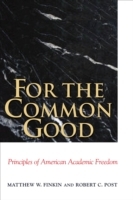Detailansicht
For the Common Good
eBook
ISBN/EAN: 9780300155549
Umbreit-Nr.: 3595679
Sprache:
Englisch
Umfang: 272 S.
Format in cm:
Einband:
Keine Angabe
Erschienen am 21.04.2009
Auflage: 1/2009
E-Book
Format: PDF
DRM: Adobe DRM
- Zusatztext
- Debates about academic freedom have become increasingly fierce and frequent. Legislative efforts to regulate American professors proliferate across the nation. Although most American scholars desire to protect academic freedom, they have only a vague and uncertain apprehension of its basic principles and structure. This book offers a concise explanation of the history and meaning of American academic freedom, and it attempts to intervene in contemporary debates by clarifying the fundamental functions and purposes of academic freedom in America.Matthew W. Finkin and Robert C. Post trace how the American conception of academic freedom was first systematically articulated in 1915 by the American Association of University Professors (AAUP) and how this conception was in subsequent years elaborated and applied by Committee A of the AAUP. The authors discuss the four primary dimensions of academic freedomresearch and publication, teaching, intramural speech, and extramural speech. They carefully distinguish academic freedom from the kind of individual free speech right that is created by the First Amendment. The authors strongly argue that academic freedom protects the capacity of faculty to pursue the scholars profession according to the standards of that profession.
- Kurztext
- Poems vivifying nature have gripped people for centuries. From Biblical times to the present day, poetry has continuously drawn us to the natural world. In this thought-provoking book, John Felstiner explores the rich legacy of poems that take nature as their subject, and he demonstrates their force and beauty. In our own time of environmental crises, he contends, poetry has a unique capacity to restore our attention to our environment in its imperiled state. And, as we take heed, we may well become better stewards of the earth.In forty brief and lucid chapters, Felstiner presents those voices that have most strongly spoken to and for the natural world. Poets—from the Romantics through Whitman and Dickinson to Elizabeth Bishop and Gary Snyder—have helped us envision such details as ocean winds eroding and rebuilding dunes in the same breath, wild deer freezing in our presence, and a person carving initials on a still-living stranded whale.Sixty color and black-and-white images, many seen for the first time, bear out visually the environmental imagination this book discovers—a poeticlegacy more vital now than ever.
